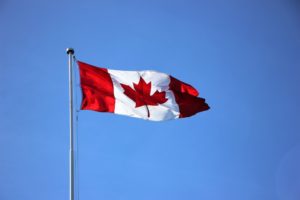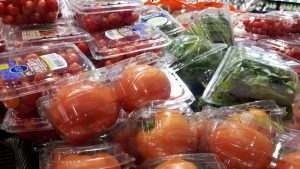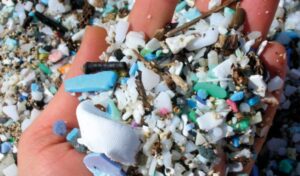- Regulatory Tools
- Circular Economy
- Government
- Government Policy
- Labelling
- Recycling
- Policy
- Strategy and Policy
- Take Action
- National
Breaking the single-use habit: reducing waste in south Georgian Bay
After learning that 10,000 metric tonnes of plastic waste enters Great Lakes each year, owners of The Chipper – a waterfront snack bar in Collingwood Ontario are doing their part to reduce single-use plastics. Collingwood councillor Tina Comi believes the municipality has an opportunity to take a leadership role on the issue in the community.
Author: Ian Adams
It was a conversation between Carole MacKenzie and her daughter that convinced her to go plastic-free.
“She called me, so upset, because they were studying what was happening with our rivers and oceans,” said MacKenzie, who operates The Chipper in Sunset Point Park with her husband, James. “She said, ‘Mom, we all have to do our part. You have to stop using plastic forks.’”
MacKenzie sourced out compostable and organic utensils, coffee lids and food trays, and acknowledged she feels a special obligation as her restaurant is right on the water — even if the cost for compostable utensils is significantly more than just using plastic.
“Some people would say to pass it on to the consumer,” MacKenzie said. “But we all have to do our part, so at the end of the year if I don’t make quite as much, who cares — I know I’m doing something to make this a better place.”
A 2017 study found about 10,000 metric tons of plastic trash found its way into the Great Lakes; Lake Huron gets about 600 tonnes.
In March, Kingston-area MPP Ian Arthur introduced Bill 82, the Single Use Plastics Ban Act, to set out targets and timelines to eventually eliminate the use of single-source plastics.
His bill is in first reading, and coincided with the opening of public comment on a discussion paper introduced by the Progressive Conservative government on reducing waste and litter.
Arthur’s bill looks to ban plastic items such as straws, coffee cup lids, polystyrene foam food and beverage containers, and plastics that break down into microplastics by 2020.
He worked with environmental groups and other stakeholders to “make sure we had something ambitious, but also achievable.”
“Those targeted items in the first year are possible,” he said. “The (European Union) has passed similar legislation with an even more aggressive time frame. The first (items proposed to be banned) were the low-hanging fruit … items where there is a price-comparative alternative out there that’s already being mass-produced.



